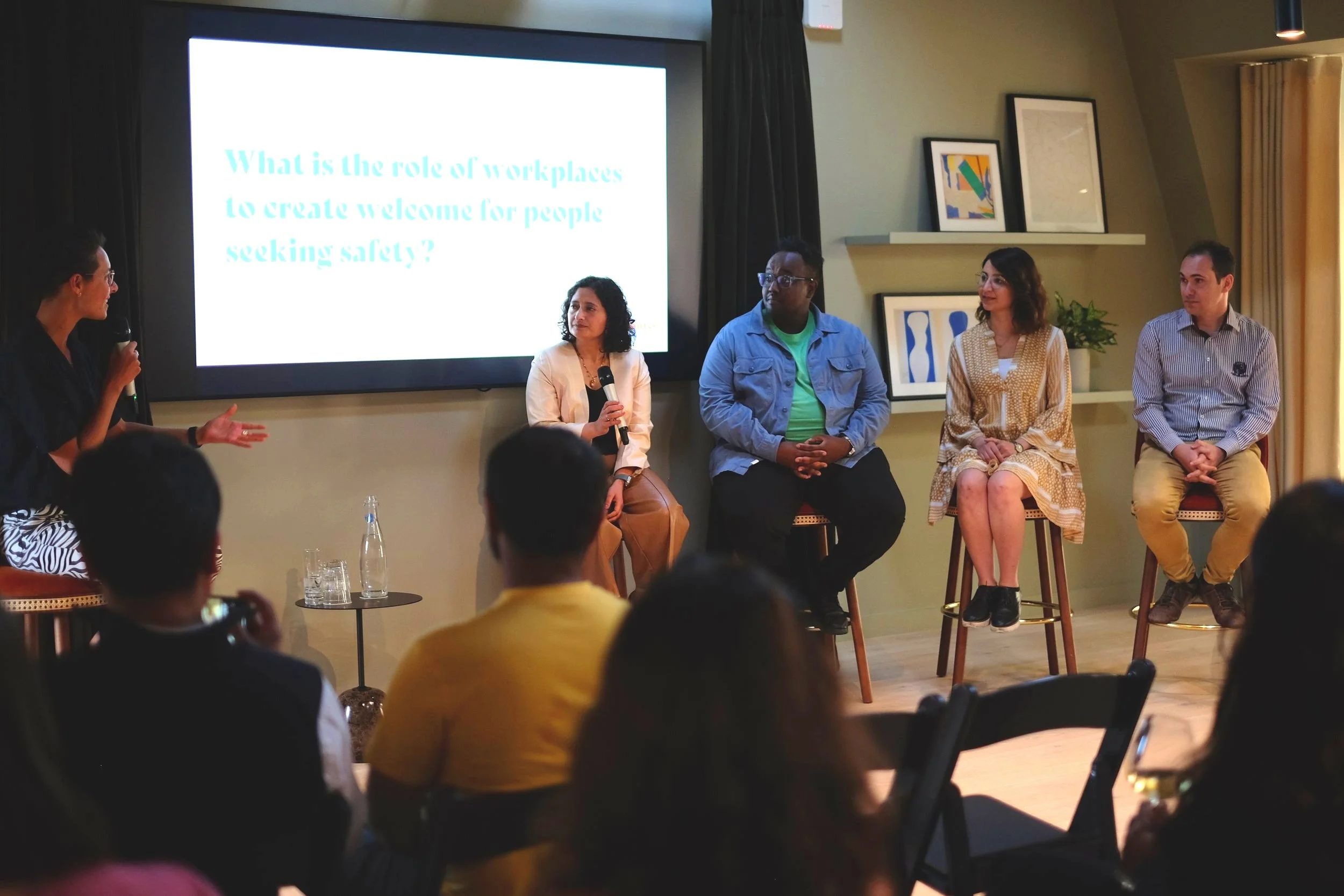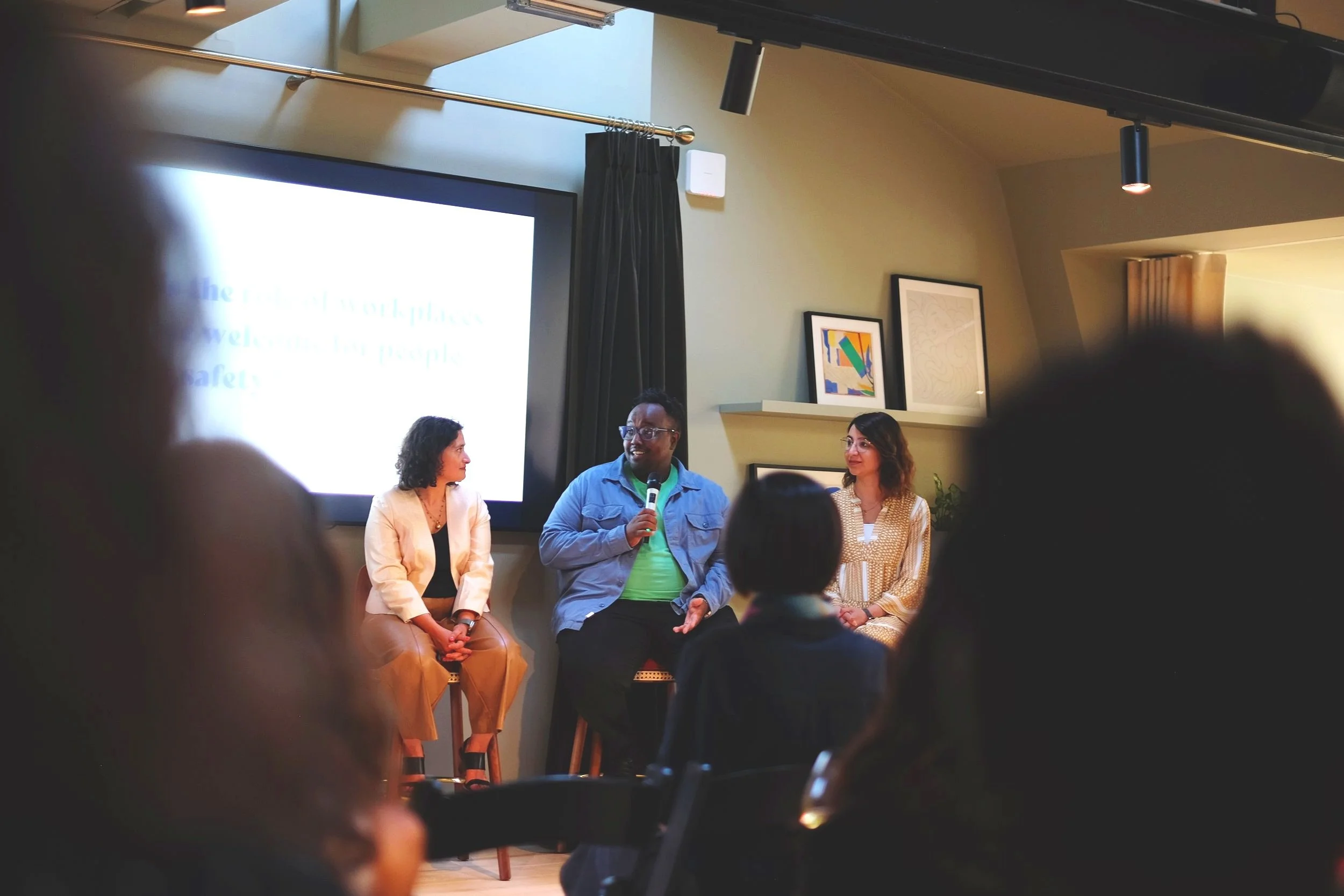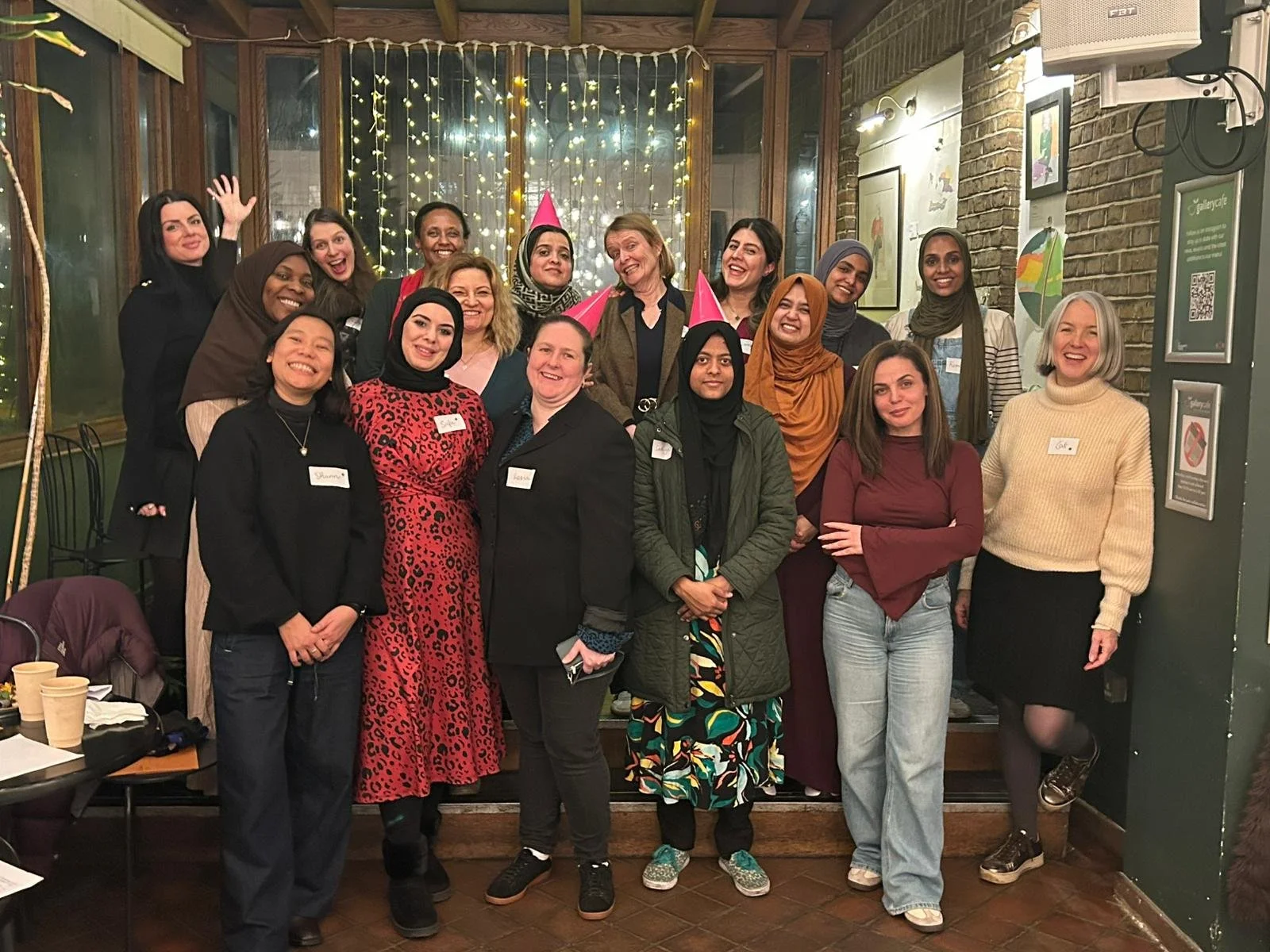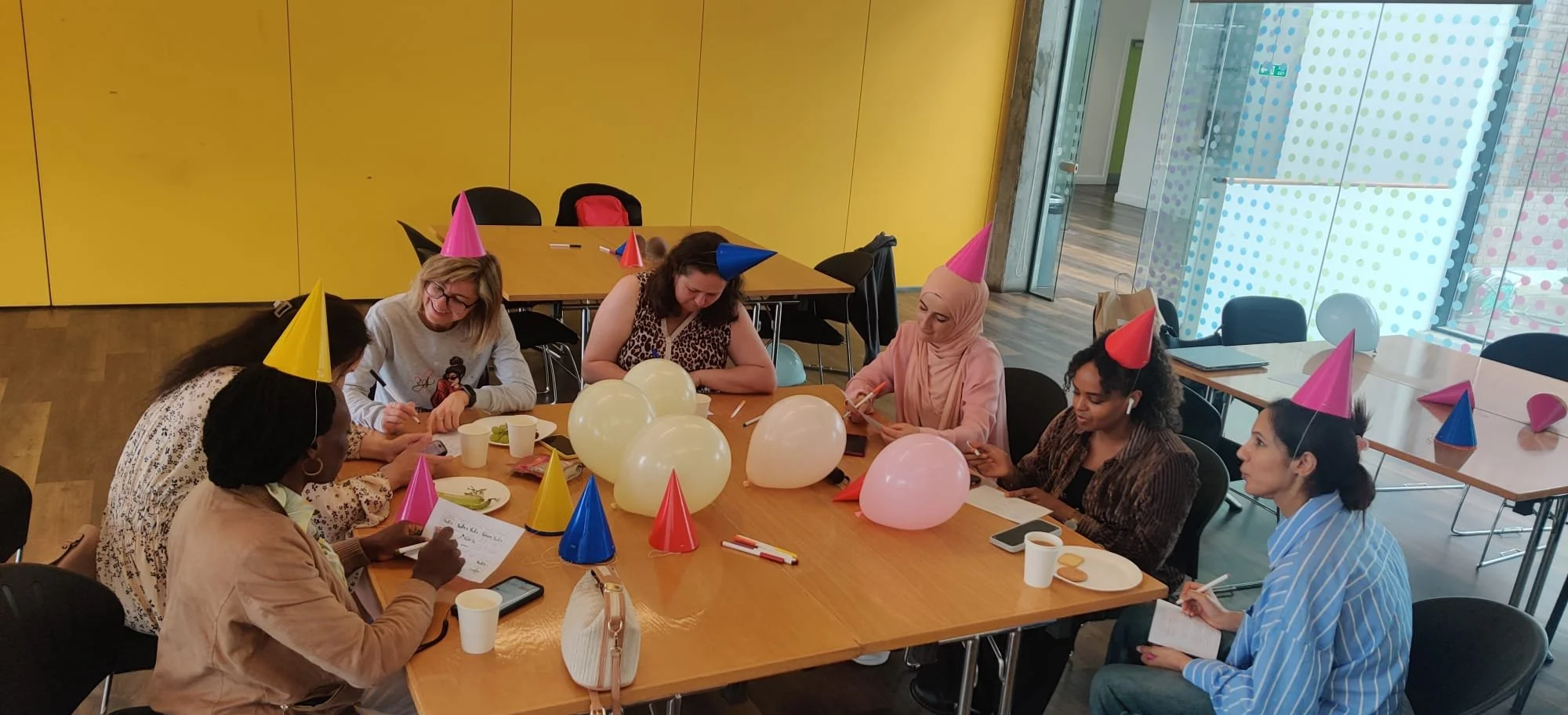Welcome at work: what you and your organisation can do to support welcome in the workplace
On 28th June 2023, Routes organised an event exploring the role of workplaces in creating compassionate welcome for those seeking safety in the UK. Meeting at the leadership organisation Chief in Central London, we heard from a brilliant panel of speakers about the opportunities and barriers to meaningful employment for people with a refugee background.
In this blog, Routes’ Head of Programmes Wieke shares the event’s key takeaways and what you and your organisation can do to support meaningful employment for refugees and asylum-seekers.
‘What is the role of workplaces to create welcome for people seeking safety?’ was organised to mark World Refugee Day. It was in line with UK’s Refugee Week’s theme of Compassion Into Action. Chaired by Routes’ Co-Founder and Board Member Daisy Jacobs, the audience heard from a strong set of speakers: Anuradha Chugh (CEO of Pukka Herbs), Harbi Jama (Head of Development at the London Community Foundation), Yusuf Ciftci (Founding Director of Experts by Experience Employment Initiative), and Roula Kheder Alsheikh (Project Development Manager for the ‘Routes to Employment’ project at Routes). People from across sectors - charity, leadership and finance, amongst others - had an opportunity to learn about inclusive employment in the UK, and what can be done to create compassionate welcome in the world of work.
The meaning of work
The evening was kicked off by Leyla McLennan and Tamana Safi from Routes, providing a brief outline of the rights of people seeking safety. Importantly, not everyone who is in the UK from a displacement background has the right to work. Refugees and individuals coming through resettlement schemes (such as the ones set up in the aftermath of the evacuation in Afghanistan, and for the conflict in Ukraine) do. Asylum-seekers generally don’t - unless they have applied for the right to work. This is something you can only do once you have been in the country for over 1 year, and you can only work in jobs on the so-called Shortage Occupation List. This situation is different from that in other European countries or the US.
This part of the conversation comes back multiple times during the event. As Harbi Jama mentions: ‘Why is it here in the UK, that we have so many people waiting? That should make us angry. Because it is about dignity, it is about fairness.’ Host Daisy Jacobs chips in: ‘We know that work is so important for people’s confidence, their mental health, their aspirations. And we know we have a system that can grind people down so intensely. Organisations should start with thinking really creatively - what are you doing in terms of opening up your doors?’
Routes panel (from left to right): chair Daisy Jacobs, Anuradha Chugh, Harbi Jama, Roula Kheder and Yusuf Ciftci.
From recruitment to onboarding
Once people have received their refugee status, the barriers to accessing meaningful employment are different. Yusuf Cifti started his own organisation to support people with lived experience into charity sector leadership. He shares: ‘First and foremost, we see a lot of focus on work experience in job vacancies. Maybe refugees have waited 5 years for their decision. There’s then a gap - how are they going to compete? If you focus on work experience and disregard people’s talents from their home countries, you won’t be able to give them a chance. The focus should be on potential: can you support them?’
Roula Kheder agrees: ‘We need support, we need training and we need to be onboarded properly in the work environment that we are working in.’
One-size-fits-whom?
Yusuf Ciftci shares a few practical things organisations can do at the recruitment stage, to be accessible for people with experience of seeking safety. ‘Currently, there is a lot of focus on a one-size-fit-all recruitment process. If you know how to write a CV and a cover letter, you can get a job. But I know many talented refugees, who might not perform well in the interview, but would be great at the job.’ He argues that there is a lot of work to be done in this area. ‘There’s so many small initiatives for people, to learn more about what it is like to be working. There’s been 3 inclusive recruitment toolkits just in the last year (including this resource by Yusuf's Experts by Experience Employment Initiative, ed.) so the knowledge is there.’
The impact of the asylum system is still felt after people have received their status, panellists agree. Yusuf Ciftci: ‘There’s a lack of confidence on people, because of the asylum system.’
Part of this, is also about creating more awareness and meaningful support for people when they want to access the jobs market. Anuradha Chugh - who currently sits on the board of Routes - speaks about her experience mentoring with Routes, while she was Managing Director at Ben & Jerry’s. ‘For me, Routes does that in a very meaningful and deep way. Routes gets you to send your employees (to participate in the Mentoring Programme, ed.), to really deeply connect with people (...) as equal(s).’
In her contribution, Roula Kheder also speaks about awareness at the stage of recruitment: ‘If there isn’t this awareness, employers might lose talent and we can really contribute. So we should be welcomed, really!’
Finally, there’s the issue of being out of work for a while, or ending up working in a different field than before. Yusuf argues that this is something that is really important for employers to be mindful of. ‘For a lot of refugees, their first job (in the UK, ed.) is trying to test their careers. So giving them a bit of space to explore themselves is really key.’
Routes’ Project Development Manager Roula, who is doing research for the new ‘Routes to Employment’ project.
Creating equitable workspaces
Harbi Jama speaks with clarity about inclusive employment practices: ‘What are employers doing to keep refugees? The first thing I ask, what are you doing to keep your current staff? You need that first, before looking at hiring refugees. You can’t hire refugees if you are not treating any of your staff well.’ He continues: ‘You need to make sure that you can support people, that you can identify any challenges and there are people who you can speak to. You need to be able to close the pay gap.’
Interestingly, some of the recent digital developments can be useful to welcome people from displaced backgrounds into work. Yusuf Cifcti argues that good use of remote working policies can be helpful.
‘For example, When you have Christmas or Eid, people might not have family here. So can you allow refugees to work from abroad, so they can spend time with their families.’
Harbi Jama adds another point that is crucial to keep in mind. ‘One thing that is super important in these conversations - we don’t know who a refugee is, until the person discloses it to you. The same thing with LGBT - you don’t know until they share. Some people will work in a workspace for 20 years - and then, when they have a safe space and the topic of refugeehood comes up, they turn around and share some of their personal experiences. Which is really beautiful, and it shows the importance of creating safe working environments, in which people feel they can share these bits of information.’
The importance of partnerships
A lot of this is about changing the conversation. As one of the audience members remarked, ‘There is a lot of work about D&I in corporates, but we never really talk about refugees.’ Harbi Jama mentions the fundraising space, and HR, as other areas that would benefit from having people with lived experience, who are able to challenge ideas and bring new ones.
Volunteering opportunities and corporate social responsibility should also be meaningful, and conversations with partners should be tailored towards that. As Harbi Jama says: ‘20 businesses doing CV workshops with refugees - it’s not useful. The people who have access to support from refugee organisations: they have already done their CV, got cover letter support.’ He instead argues for more funding for organisations doing this type of work. ‘Charities and CIC need donations to work and support and thrive.’
Routes panellist Harbi Jama, who is working at the London Community Foundation.
Harbi is clear that a core part of this work is commitment. ‘You need to really have that embedded into your organisation. You can’t just pick and choose when you want to support refugees. What we need to do is making sure that businesses are doing this work proactively. Businesses who are doing it well, are doing it well for a long time. And there are those that are learning, and starting.’
Anuradha Chugh agrees: ‘The hard work has to be done in the organisation before. First, within the company, you need to really get the mindset, the policies, and equity across people in the right place. Only after that can you get into advocacy. And once you do, use whatever platform you have, whatever agency you have - give it space. It doesn’t have to be a big billion campaign to be able to do that.’
Key takeaways from the panel on creating welcome in the workplace
Yusuf: ‘The evidence is there. A lot of initiatives are creating equitable services. So it is now all about action.’
Roula: ‘Do not stereotype refugees. Don’t put people in boxes. Don’t put expectations for them - they might surprise you!’
Harbi: ‘Celebrate the amazing people - lots of people that have contributed so much to the UK. (...) And if you want to create opportunities, make sure they are meaningful.’
Anuradha: ‘Each of us have agency. Talk to your father, your kids, your company - whatever it is. Don’t leave it for an event. Literally, do it next week - today is Thursday, so you have time!’
What can you do next?
If you are a woman with lived experience of the UK asylum system, Routes is currently doing some research as part of our new project Routes to Employment. You can participate by filling out the form here.
Support the Lift the Ban-campaign to give people seeking asylum the right to work. More information can be found on the website of Refugee Action.
If you are interested in mentoring with Routes and embarking on a four-month, engaging learning journey with a woman from a refugee background, applications are open now for our autumn Programme.
If you are or know of any socially-minded businesses, prioritising inclusive leadership, we would love to hear from you! Our work is done by partnerships and referrals, and you can connect with hanna@routescollective.com to chat more.
Lastly, Routes has an Access Fund to cover the cost of travel expenses and data costs for refugee and asylum seeking women on our Mentoring Programme. You can donate here.






